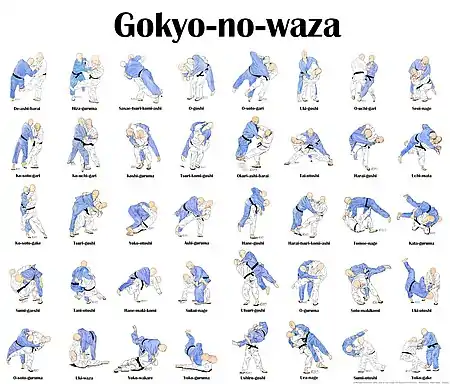Like many other martial arts, Kodokan judo provides lists of techniques students must learn to earn rank. For a more complete list of judo techniques by technique classification, including Japanese kanji, see the article judo techniques.
Ukemi (breakfalls)
Students first learn how to fall, and must master the fall exercises before moving on to the throws lists.[1]
- Mae ukemi, forward fall.
- Ushiro ukemi, backward fall.
- Yoko ukemi, side fall (accompanied by hard slap of tatami mat).
- Mae Mawari Ukemi, forward judo roll.
Nage-waza (throwing techniques)

The 68 throws of Kodokan judo[2]
Dai ikkyo
(1st group)
- Deashi harai (or barai)
- Hiza guruma
- Sasae tsurikomi ashi
- Uki goshi
- Osoto gari (Major Outside Reap)
- O goshi
- Ouchi gari
- Seoi nage
Dai nikyo
(2nd group)
Dai sankyo
(3rd group)
Dai yonkyo
(4th group)
Dai gokyo
(5th group)
Habukareta waza
(preserved techniques from 1895 gokyo)
Shinmeisho no waza
(newly accepted techniques in 1987, 1997 and 2017)
- Morote gari (双手刈)
- Kuchiki taoshi (朽木倒)
- Kibisu gaeshi (踵返)
- Uchi mata sukashi
- Tsubame gaeshi
- Kouchi gaeshi
- Ouchi gaeshi
- Osoto gaeshi
- Harai goshi gaeshi
- Uchi mata gaeshi
- Hane goshi gaeshi
- Kani basami
- Osoto makikomi
- Kawazu gake
- Harai makikomi
- Uchi mata makikomi
- Sode tsurikomi goshi
- Ippon seoi nage
- Obi tori gaeshi
- Kouchi makikomi
- Daki age was excluded as a Kodokan officially recognized technique.
Katame-waza (grappling techniques)
The 32 official grappling techniques of Kodokan judo[3]
Osaekomi-waza
(pins / mat holds)
- Kesa-gatame (崩袈裟固)
- Kata-gatame (肩固)
- Kami-shiho-gatame (上四方固)
- Kuzure-kami-shiho-gatame (崩上四方固)
- Yoko-shiho-gatame (横四方固)
- Tate-shiho-gatame (縦四方固)
- Kuzure-kesa-gatame (袈裟固)
- Uki-gatame (浮固)(Added 2017)
- Ura-gatame (裏固)(Added 2017)
- Ushiro-kesa-gatame (後袈裟固)(Added 2017)
Shime-waza
(chokes or strangles)
- Nami-juji-jime (並十字絞)
- Gyaku-juji-jime (逆十字絞)
- Kata-juji-jime (片十字絞)
- Hadaka-jime (裸絞)
- Okuri-eri-jime (送襟絞)
- Kata-ha-jime (片羽絞)
- Do-jime (胴絞)
- Sode-guruma-jime (袖車絞)
- Kata-te-jime (片手絞)
- Ryo-te-jime (両手絞)
- Tsukkomi-jime (突込絞)
- Sankaku-jime (三角絞)
Kansetsu-waza
- Ude-garami (腕緘)
- Ude-hishigi-juji-gatame (腕挫十字固) "Arm Breaking Cross Lock"
- Ude-hishigi-ude-gatame (腕挫腕固) "Arm Breaking Arm Lock"
- Ude-hishigi-hiza-gatame (腕挫膝固) "Arm Breaking Knee Lock"
- Ude-hishigi-waki-gatame (腕挫腋固) "Arm Breaking Underarm Lock"
- Ude-hishigi-hara-gatame (腕挫腹固) "Arm Breaking Belly Lock"
- Ashi-garami (足緘)
- Ude-hishigi-ashi-gatame (腕挫脚固)
- Ude-hishigi-te-gatame (腕挫手固)
- Ude-hishigi-sankaku-gatame (腕挫三角固)
Kinshi-waza (forbidden techniques)
These are techniques that have been removed from competition, mostly because of their high risk of injury.
- Ashi-garami (足緘)
- Do-jime (胴絞)
- Kani-basami (蟹挟)
- Kawazu-gake (河津掛)
See also
References
- ↑ Falling Archived 2006-09-30 at the Wayback Machine
- ↑ Name of Judo Techniques
- ↑ "Names of judo techniques" (PDF). Archived (PDF) from the original on 2017-06-23.
External links
- Judoinfo site
- JudoVideo—Reference for the Kodokan judo techniques
This article is issued from Wikipedia. The text is licensed under Creative Commons - Attribution - Sharealike. Additional terms may apply for the media files.